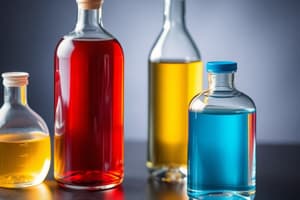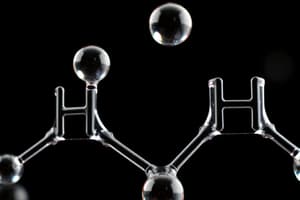Podcast
Questions and Answers
What is the difference between alcohols and phenols?
What is the difference between alcohols and phenols?
- Alcohols have an OH group connected to a carbon in a benzene ring, while phenols have an OH group connected to a saturated sp3 hybridized carbon.
- Alcohols and phenols are the same thing.
- Alcohols have two organic groups bonded to the same oxygen atom, while phenols have an OH group connected to a carbon in a benzene ring.
- Alcohols have an OH group connected to a saturated sp3 hybridized carbon, while phenols have an OH group connected to a carbon in a benzene ring. (correct)
What is the IUPAC naming rule for primary alcohols?
What is the IUPAC naming rule for primary alcohols?
- Replace -e with -ol in the longest carbon chain containing the OH group. (correct)
- Replace -e with -al in the longest carbon chain containing the OH group.
- Replace -e with -ene in the longest carbon chain containing the OH group.
- Replace -e with -one in the longest carbon chain containing the OH group.
Why do alcohols and phenols have higher boiling points than similar alkanes and alkyl halides?
Why do alcohols and phenols have higher boiling points than similar alkanes and alkyl halides?
- Due to resonance stabilization of the phenoxide ion.
- Due to the presence of a benzene ring.
- Due to hydrogen bonding. (correct)
- Due to the formation of stable carbocation.
What is the Williamson ether synthesis?
What is the Williamson ether synthesis?
What is the difference between the synthesis of alcohols and phenols?
What is the difference between the synthesis of alcohols and phenols?
What is the effect of high intake of ethanol on the human body?
What is the effect of high intake of ethanol on the human body?
What is the oldest method of preparing ethanol?
What is the oldest method of preparing ethanol?
What is the difference between SN1 and SN2 mechanisms for ether reactions?
What is the difference between SN1 and SN2 mechanisms for ether reactions?
What is the difference between alcohols and phenols?
What is the difference between alcohols and phenols?
How are simple ethers named?
How are simple ethers named?
What is the difference between alcohols and alkyl halides in terms of boiling points?
What is the difference between alcohols and alkyl halides in terms of boiling points?
What is the IUPAC name for a primary alcohol?
What is the IUPAC name for a primary alcohol?
What is the process for synthesizing alcohols?
What is the process for synthesizing alcohols?
What is the process for synthesizing ethers?
What is the process for synthesizing ethers?
What is the process for preparing phenols?
What is the process for preparing phenols?
What is the process for producing ethanol industrially?
What is the process for producing ethanol industrially?
Flashcards are hidden until you start studying
Study Notes
Alcohols, Phenols, and Ethers: Naming, Properties, and Reactions
-
Alcohols contain an OH group connected to a saturated sp3 hybridized carbon, while phenols contain an OH group connected to a carbon in a benzene ring.
-
Ethers have two organic groups bonded to the same oxygen atom, and thiols and sulfides are sulfur analogs of alcohols and ethers.
-
Alcohols can be classified as primary (1), secondary (2), or tertiary (3), and their IUPAC names involve selecting the longest carbon chain containing the OH group as the parent and replacing –e with –ol.
-
Phenols use “phenol” as the parent hydrocarbon name, and their IUPAC names follow the rules for naming disubstituted benzene.
-
Simple ethers are named by identifying the two organic substituents and adding the word ether, while other functional groups present in the ether part are considered alkoxy substituents.
-
Alcohols and phenols have much higher boiling points than similar alkanes and alkyl halides due to hydrogen bonding.
-
Alcohols can act as weak bases and weak acids, and phenols are much more acidic than alcohols due to resonance stabilization of the phenoxide ion.
-
Alcohols can be synthesized by the hydration of alkenes, reduction of carbonyl compounds, or acid-catalyzed dehydration, while phenols can be prepared from aromatic compounds by treating them with SO3/H2SO4.
-
Oxidation of alcohols produces carbonyl compounds, and primary alcohols can be oxidized to aldehydes or carboxylic acids, while secondary alcohols can be oxidized to ketones.
-
Ethers can be synthesized by the reaction of alkoxide ions with primary alkyl halides in the Williamson ether synthesis, while phenols can be converted to ethers by reacting with alkyl halides in the presence of a base.
-
Phenols undergo electrophilic aromatic substitution reactions, and oxidation of phenol with strong oxidizing agents produces quinones.
-
Quinones, such as ubiquinones, are biooxidizing agents that mediate electron transfer processes involved in energy production through their redox reactions.Synthesis and Reactions of Ethers, Ethanol Production and Effects
-
Alkoxide anion with primary alkyl halide produces ethers.
-
Alkoxide anions are produced by reacting alcohols with metal or metal hydrides.
-
Ethers are generally unreactive, but can be cleaved by strong acids at elevated temperatures.
-
Ethyl isopropyl ether can react with HI or HBr to produce an alkyl halide via SN2 mechanism.
-
Tertiary ethers undergo SN1 mechanism due to the formation of stable carbocation.
-
Fermentation of sugar and grain using yeast is the oldest method of preparing ethanol.
-
Industrially, ethanol is produced by acid-catalyzed hydration of ethylene.
-
Ethanol is a CNS depressant and high intake can lead to respiratory and cardiovascular issues, even death.
-
In the stomach, ethanol increases the production of acid and reduces body temperature.
-
Ethanol produces aldehydes in the liver, which can cause liver damage.
-
Homework problems related to the synthesis and reactions of ethers are given.
-
The production and effects of ethanol on the human body are discussed.
Studying That Suits You
Use AI to generate personalized quizzes and flashcards to suit your learning preferences.




